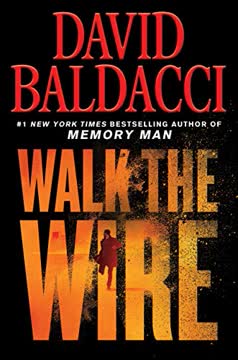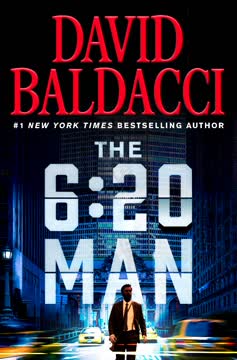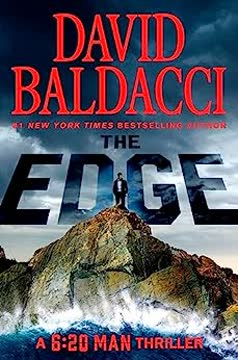Plot Summary
Fracking Town, Dead Woman
In the boomtown of London, North Dakota, a mutilated woman's corpse is discovered by Hal Parker, a local hunter. The body, later identified as Irene Cramer, is found in a remote field, autopsied postmortem, and missing her brain. The town is a microcosm of fracking-fueled prosperity and social tension, with transient workers, environmental hazards, and a sense of lawlessness. The murder's brutality and the victim's mysterious background draw the attention of the FBI, who send Amos Decker and his partner Alex Jamison to investigate. The case's oddities—professional incisions, lack of blood, and a staged crime scene—immediately suggest something more than a local crime of passion.
Decker Arrives, Secrets Lurk
Decker and Jamison arrive, greeted by local detective Joe Kelly, who is overworked and skeptical of federal involvement. They quickly learn that Irene Cramer led a double life: a teacher at the insular Brothers' Colony by day, and possibly an escort by night. The town's power structure is dominated by two rival magnates, Hugh Dawson and Stuart McClellan, whose fortunes and feuds shape local politics. The agents sense that everyone is hiding something, from the coroner to the religious sect, and that the murder is a symptom of deeper, more dangerous secrets.
The Autopsy's Hidden Clues
The local coroner, Walt Southern, reveals that Cramer's body was expertly dissected, with her stomach and intestines sliced open—details he buries in his report. Decker, with his perfect memory and synesthesia, notices the omissions and suspects a cover-up. The autopsy suggests the killer was searching for something Cramer had swallowed, possibly evidence or contraband. The coroner's evasiveness and later suicide point to blackmail and a wider conspiracy. The investigation is further complicated when another body—Pamela Ames, a young woman from the Brothers' Colony—is found murdered, and Hal Parker, the hunter, goes missing.
The Brothers' Colony
The Brothers' Colony, a communal Anabaptist group, is both a haven and a crucible for the town's tensions. Cramer was their beloved teacher, but her secret life and murder shake the community. The colony's leaders, Peter Gunther and Milton Ames, are shocked by the violence, but it's Susan Ames, Milton's wife, who reveals that Cramer was troubled and had received a disturbing note before her death. The colony's proximity to a decommissioned Air Force radar station—now run by a private contractor, Vector—raises questions about land deals, government secrets, and the true nature of the facility next door.
Double Lives, Double Motives
As Decker and Jamison dig deeper, they find that nearly everyone in town is living a double life. Cramer's past is a blank slate, her fingerprints triggering alarms in federal databases. Pamela Ames, the second victim, had left the colony and was working as a waitress, but was found dressed as a prostitute—another staged scene. The coroner's wife, Liz Southern, is evasive, and her relationship with Caroline Dawson, Hugh's daughter, is more than it seems. The town's power brokers, Dawson and McClellan, are locked in a rivalry that may be turning deadly, and the local police are out of their depth.
The Missing Hunter
Hal Parker, the hunter who found Cramer's body, vanishes. His home shows signs of a struggle, and a second body is found in his shed. The evidence suggests Parker stumbled onto something he shouldn't have—possibly tire tracks linking the crime scene to a local vehicle. The investigation points to a calculated effort to silence witnesses and tie up loose ends. Decker suspects that the murders are connected to something much larger than personal vendettas or small-town secrets.
Oil, Power, and Rivalry
The fracking boom has transformed London into a place of sudden wealth and social upheaval. Hugh Dawson and Stuart McClellan, the town's rival tycoons, are both suspects and potential victims. Their business dealings, family tragedies, and personal animosities create a web of motives. Dawson's daughter Caroline is caught between loyalty and ambition, while McClellan's son Shane is haunted by his father's expectations. The town's economic engine is also its greatest vulnerability, as outside interests and shadowy investors circle the oil fields.
The Prison Next Door
The decommissioned Air Force station, now run by Vector, is more than a radar array. Decker and Jamison, aided by covert operative Will Robie, discover that the facility is being used as a black site prison, holding foreign detainees and conducting illegal interrogations. The presence of ambulances, security contractors, and clandestine flights suggest a cover-up at the highest levels. The prison is a red herring, however, distracting from an even greater threat buried beneath the land.
The Ticking Time Bomb
The real secret is a Cold War-era bunker beneath the land adjacent to the Air Force station, now owned by the Brothers' Colony and leased to a mysterious fracking company, All-American Energy. Decades ago, the Air Force hid a stockpile of experimental chemical and biological weapons there, in violation of presidential orders. Ben Purdy, a former Air Force tech, learns of the bunker from a retired radar operator, Brad Daniels, and sells the secret to foreign interests. The plan: use fracking to breach the bunker and release the toxins, contaminating the oil fields and crippling America's energy independence.
The Mercenary Threat
As Decker and Robie close in, they are targeted by mercenaries hired by Purdy's backers—shadowy Middle Eastern and Russian interests. Multiple assassination attempts, including a robot attack on the nursing home and a deadly ambush at an abandoned building, raise the stakes. Purdy, motivated by greed and resentment, orchestrates the plot, killing his own mother and eliminating anyone who threatens to expose him. The town becomes a battleground, with Decker, Jamison, Robie, and sniper Jessica Reel fighting to prevent disaster.
The Bunker Beneath
Decker, with the help of his brother-in-law Stan Baker, realizes that the fracking operation is about to unleash the buried weapons. In a desperate move, they flood the vent pipe with water and concrete, stopping the release just in time. Federal authorities descend on the site, and the true nature of the threat is revealed: a synthetic, airborne plague designed to linger for centuries. The plot's exposure averts a catastrophe, but the local conspirators remain at large, and the town's wounds are far from healed.
Love, Greed, and Betrayal
The investigation into the original murders comes full circle. Liz Southern, the coroner's wife, is revealed as the killer of Irene Cramer, Pamela Ames, and others. Driven by a secret love for Caroline Dawson and a desire to protect their relationship and secure Caroline's inheritance, Southern eliminates anyone who threatens exposure. She manipulates evidence, blackmails her husband, and forges suicide notes to cover her tracks. The final confrontation ends in violence, with Southern killed by Shane McClellan, saving Caroline's life.
The Final Confrontation
With the plot foiled and the killers unmasked, Decker and Jamison reflect on the cost of secrets, the corrosive power of greed, and the complexities of love and loyalty. The town's survivors—Caroline, Shane, and Kelly—must rebuild, forging a new partnership to guide London's future. Decker, haunted by his own losses, finds a measure of closure in the case's resolution, but is left pondering the limits of justice and the burdens of memory.
Aftermath and New Beginnings
As federal authorities clean up the mess and mete out quiet, diplomatic consequences to the foreign powers involved, the town of London begins to heal. Decker reconnects with his family, Jamison with hers, and the trio of Caroline, Shane, and Kelly take up the challenge of leading their community. The story ends with Decker contemplating the meaning of family, the necessity of facing the past, and the possibility of finding peace—even for those who walk the wire between memory and forgetting.
Characters
Amos Decker
Decker is a former football player turned FBI agent, marked by hyperthymesia (total recall) and synesthesia (cross-wired senses) after a traumatic brain injury. His inability to forget, combined with his emotional detachment and relentless logic, makes him a formidable investigator but a difficult partner and family member. Decker is driven by a need for justice, haunted by the murder of his own family, and struggles with guilt, isolation, and the fear of losing his identity. Over the course of the story, he confronts not only external threats but also his own limitations and the possibility of healing.
Alex Jamison
Jamison is Decker's FBI partner, a former journalist with a sharp mind, strong ethics, and a capacity for compassion that balances Decker's bluntness. She is physically fit, emotionally intelligent, and unafraid to challenge Decker or the system. Jamison's own history of failed relationships and family expectations gives her insight into the town's secrets and the psychological toll of double lives. She serves as Decker's confidante, conscience, and occasional protector, growing in confidence and agency as the case unfolds.
Joe Kelly
Kelly is the lone detective in London, juggling a flood of crimes in a town transformed by the fracking boom. He is competent, honest, and deeply connected to the community, but also carries personal scars—his sister died from addiction and prostitution, and he harbors unrequited love for Caroline Dawson. Kelly's empathy and local knowledge are invaluable to the investigation, but his emotional involvement clouds his judgment at times. He ultimately plays a key role in the story's resolution and the town's future.
Caroline Dawson
Caroline is the daughter of Hugh Dawson, groomed to inherit the family's business empire. Outwardly confident, hardworking, and socially adept, she is also burdened by family tragedy (her brother's suicide, her mother's death) and the expectations of others. Caroline's secret relationship with Liz Southern and her struggle for autonomy drive much of the personal drama. She is both a victim and a survivor, forced to confront betrayal, loss, and the challenge of forging her own path.
Liz Southern
Liz is the wife of the town's coroner, a skilled mortician, and Caroline's secret lover. Intelligent, manipulative, and emotionally volatile, she is driven by a possessive love for Caroline and a willingness to do anything to protect their relationship and secure Caroline's inheritance. Liz's actions—murder, blackmail, and deception—are motivated by a toxic blend of love, greed, and fear. Her psychological unraveling and ultimate downfall are central to the story's climax.
Ben Purdy
Purdy is a brilliant but embittered Air Force sergeant who learns of the buried weapons and sells the secret to foreign interests. Motivated by greed, ambition, and a sense of being undervalued, he orchestrates the plot to release the toxins, kills his own mother, and eliminates threats with ruthless efficiency. Purdy's actions are a dark mirror of the story's themes: the dangers of secrecy, the corrupting power of money, and the consequences of betrayal.
Will Robie
Robie is a government assassin, called in to protect Decker and Jamison and to investigate the international dimensions of the plot. Calm, resourceful, and deadly, he operates in the moral gray zones of national security. Robie's partnership with sniper Jessica Reel and his interactions with Decker highlight the differences between law enforcement and espionage, as well as the personal costs of living in the shadows.
Jessica Reel
Reel is a legendary sniper, Robie's equal in skill and resolve. She arrives in time to save Robie and Decker from mercenary attacks, and her presence underscores the seriousness of the threat. Reel is laconic, focused, and fiercely loyal, embodying the story's theme of sacrifice for the greater good.
Hugh Dawson
Dawson is the town's leading businessman, a self-made man whose ambition and pride have cost him dearly. His relationships with his children, his rivalry with McClellan, and his own moral compromises make him both a suspect and a victim. Dawson's inability to adapt to change and his blindness to those closest to him set the stage for tragedy.
Stuart McClellan
McClellan is Dawson's counterpart, a fracking magnate whose wealth and influence are matched only by his capacity for cruelty. His business dealings, family dynamics, and possible involvement in past crimes make him a central figure in the town's drama. His murder, staged as a suicide, is a turning point in the investigation.
Plot Devices
Dual Narrative Structure
The story alternates between the murder investigation and the unfolding geopolitical conspiracy, with Decker and Jamison pursuing local leads while Robie and Reel tackle the international angle. This structure allows for suspenseful pacing, gradual revelation of secrets, and the convergence of personal and global stakes.
Red Herrings and False Leads
The narrative is filled with plausible suspects, staged crime scenes, and misleading evidence—suicide notes, forged autopsy reports, and manipulated timelines. The secret prison at the Air Force station serves as a major red herring, distracting from the true threat beneath the ground.
Foreshadowing and Symbolism
The recurring motif of the "ticking time bomb," the environmental hazards of fracking, and the town's obsession with secrecy all foreshadow the ultimate revelation of the buried weapons. The use of color (Decker's synesthesia), recurring references to family, and the motif of "walking the wire" symbolize the precarious balance between truth and deception.
Psychological Complexity
The story delves into the inner lives of its characters, exploring trauma, guilt, love, and ambition. The interplay of personal and collective motives—love, greed, revenge, loyalty—creates a web of causality that is both plausible and emotionally resonant.
High-Stakes Action and Escalation
The plot moves from a single murder to a series of killings, then to assassination attempts, mercenary attacks, and the threat of mass destruction. The pacing accelerates as the protagonists race against time to prevent catastrophe, culminating in a series of confrontations and revelations.
Analysis
Walk the Wire is a masterful blend of murder mystery, small-town drama, and geopolitical thriller, using the microcosm of a North Dakota fracking town to explore themes of secrecy, ambition, and the corrosive effects of power. At its core, the novel is about the dangers of buried truths—whether personal, familial, or national—and the lengths to which people will go to protect or exploit them. The story interrogates the costs of progress, the fragility of community, and the moral ambiguities of justice in a world where the lines between right and wrong, love and obsession, loyalty and betrayal, are constantly shifting. Through its complex characters and layered plot, the book warns of the perils of ignoring history, the seductions of easy money, and the necessity of facing the past to build a better future. Ultimately, Walk the Wire is a meditation on memory, loss, and the possibility of redemption, reminding us that even in the darkest places, the search for truth—and for family—endures.
Last updated:
FAQ
Synopsis & Basic Details
What is Walk the Wire about?
- A Mutilated Discovery: In the booming North Dakota fracking town of London, a hunter named Hal Parker stumbles upon the brutally mutilated body of Irene Cramer, a woman leading a mysterious double life as a teacher and possible escort. Her post-mortem autopsy and missing brain immediately signal a crime far beyond local understanding.
- FBI Investigation Unfolds: FBI agents Amos Decker, with his perfect recall, and Alex Jamison are dispatched to London, where they uncover a town rife with secrets, powerful rivalries between local magnates, and a hidden government facility. The initial murder quickly escalates into a series of interconnected deaths and disappearances.
- Unveiling Deeper Conspiracies: As Decker and Jamison delve into Cramer's past and the town's hidden layers, they unearth a Cold War-era secret involving buried biochemical weapons, a black-site prison, and a plot by foreign interests to cripple America's energy independence. The investigation becomes a race against time to prevent a catastrophic release.
Why should I read Walk the Wire?
- Intricate Plot Weaving: Walk the Wire masterfully blends a small-town murder mystery with a high-stakes geopolitical thriller, offering layers of conspiracy that keep readers guessing until the very end. David Baldacci's signature plotting ensures a relentless pace and surprising twists.
- Deep Character Exploration: The novel delves into the psychological complexities of its characters, particularly Amos Decker's ongoing struggle with his unique abilities and past trauma, and the hidden motivations driving seemingly ordinary people to extraordinary acts. It's a compelling study of human nature under pressure.
- Timely & Relevant Themes: Beyond the thrilling plot, the book explores contemporary issues like the environmental and social impact of the fracking industry, government secrecy, and the moral ambiguities of national security, making it a thought-provoking read.
What is the background of Walk the Wire?
- North Dakota's Fracking Boom: The story is set against the backdrop of North Dakota's real-world oil and gas fracking boom, transforming remote areas into bustling, often chaotic, economic hubs. This setting introduces themes of rapid growth, transient populations, and the social tensions that arise from sudden wealth and environmental impact.
- Real-World Military Inspiration: As noted by the author, the concept for the London Air Force Station and the Brothers' Colony was inspired by the actual Stanley R. Mickelsen Safeguard Complex near Grand Forks, North Dakota, and the Air Force's auctioning of adjacent land to a Hutterite (Anabaptist) sect in 2012. This historical detail grounds the fictionalized military secrets.
- Cold War Legacy: The novel taps into the lingering shadows of the Cold War, particularly the development and potential concealment of chemical and biological weapons. This historical context provides a chilling backdrop for the "ticking time bomb" plot, highlighting the long-term consequences of past government actions.
What are the most memorable quotes in Walk the Wire?
- "Mother Nature always had the upper hand over man, he knew, no matter how much fancy equipment they put on." (Chapter 1): This quote, from Hal Parker's initial thoughts, subtly foreshadows the overwhelming power of the natural world and the hidden dangers buried beneath the earth, which ultimately challenge human ambition and technology.
- "This is the Wild West, Alex. It's like the California Gold Rush of 1849, only on steroids." (Chapter 3): Decker's observation encapsulates the lawless, opportunistic atmosphere of London, North Dakota, driven by the fracking boom, setting the stage for the moral compromises and violence that permeate the story.
- "The sins of the parents can carry over to their children, Alex." (Chapter 25): Decker's profound statement to Jamison becomes a central thematic thread, explaining Irene Cramer's hidden past and the generational burdens carried by characters like Caroline Dawson and Ben Purdy, linking personal trauma to broader conspiracies.
- "I don't think there's any such thing [as a perfect little girl]." (Chapter 39): Caroline Dawson's poignant remark reflects her struggle against her father's expectations and the societal pressures that shaped her life, revealing her desire for authenticity beyond superficial appearances.
- "Love... Liz's twisted, terrible love for Caroline. But love all the same." (Chapter 87): Jamison's final insight into Liz Southern's motivations distills the complex interplay of affection, obsession, and destructive behavior, suggesting that even the darkest acts can stem from a perverted form of love, a powerful thematic conclusion to the Walk the Wire analysis.
What writing style, narrative choices, and literary techniques does David Baldacci use?
- Propulsive Pacing and Chapter Structure: Baldacci employs short, impactful chapters that often end on cliffhangers, driving the narrative forward with relentless momentum. This creates a sense of urgency and keeps the reader constantly engaged, a hallmark of his thriller writing style.
- Dual Narrative Structure and Converging Plots: The novel utilizes a dual narrative structure, alternating between Decker and Jamison's local murder investigation and Robie and Reel's covert operations. This choice allows for a gradual revelation of the overarching conspiracy, showing how seemingly disparate events are intricately connected, enhancing the overall Walk the Wire analysis.
- Sensory Detail and Synesthesia: Decker's unique synesthesia is not just a character quirk but a narrative device, offering vivid, often unsettling, sensory descriptions (e.g., dead bodies in electric blue). This technique immerses the reader in Decker's perception and underscores his internal struggles, adding a unique layer to the psychological complexities of the protagonist.
Hidden Details & Subtle Connections
What are some minor details that add significant meaning?
- The "Baseball Stitch" Suture (Chapter 1): Hal Parker's recognition of the Y-incision as a "baseball stitch" from TV cop shows, rather than a medical context, subtly highlights the killer's attempt to mimic forensic procedures without true professional knowledge, a detail Decker later exploits. This minor observation hints at the staged nature of the initial autopsy.
- Caroline's Porsche SUV with Special Tires (Chapter 22): Stan Baker mentions Caroline's distinctive vehicle. This seemingly throwaway detail becomes crucial when Decker later identifies the unique tire tracks at Hal Parker's property, linking Caroline (and by extension, Liz Southern) to the crime scene and the abduction.
- The Unused Mechanical Bull at OK Corral (Chapter 6): Liz Southern explains the bull was removed due to "legal liability issues" from injured frackers. This small detail reflects the transient, high-risk culture of the boomtown and the underlying tension between quick money and long-term consequences, mirroring the larger, hidden dangers of the fracking operations.
What are some subtle foreshadowing and callbacks?
- Decker's Plane Crash Story (Chapter 2): Decker casually mentions surviving a college plane crash, explaining his calm during turbulence. This serves as a subtle callback to his past traumas and resilience, foreshadowing his ability to remain composed in the face of escalating danger throughout the investigation. It also hints at the "billion to one" odds he feels he's beaten, a dark irony given the constant threats he faces.
- The "Ticking Time Bomb" Comment (Chapter 22): Ben Purdy's drunken remark to Stan Baker about "sitting on a fucking time bomb" is direct, yet initially vague, foreshadowing of the buried biochemical weapons. This seemingly throwaway line becomes the central mystery driving the latter half of the plot, a key element in the Walk the Wire analysis.
- The "Heaven" License Plate (Chapter 81): Liz Southern's Mustang convertible has a personalized plate reading "HEAVN." This seemingly innocuous detail subtly foreshadows her twisted, almost divine, sense of justification for her murders, believing she is acting for a "greater good" (her love for Caroline), and ultimately her desire for a final, shared fate.
What are some unexpected character connections?
- Stan Baker and Caroline Dawson's Relationship: The romantic connection between Decker's recently divorced, older brother-in-law and the ambitious, younger heiress is unexpected. It highlights Caroline's search for genuine connection beyond her father's world and Stan's protective nature, adding a layer of personal drama to the town's power dynamics.
- Brad Daniels and Ben Purdy's Shared History: The discovery that the elderly Brad Daniels and the much younger Ben Purdy both attended the same Air Force anniversary event (Chapter 59) and that Daniels shared classified information about the London AFS's past, is a critical, unexpected link. This connection directly leads Decker to the "ticking time bomb" of the buried WMDs.
- Liz Southern and Caroline Dawson's Secret Romance: The revelation of Liz Southern's deep, hidden romantic relationship with Caroline Dawson is the most unexpected and pivotal character connection. It completely recontextualizes Liz's motivations, transforming her from a grieving widow into a manipulative killer driven by a possessive love and a desire to secure Caroline's future, a central aspect of the Liz Southern motivations analysis.
Who are the most significant supporting characters?
- Hal Parker: Initially presented as merely the discoverer of Irene Cramer's body, Parker's background as a skilled hunter and tracker becomes crucial. His disappearance and the discovery of Pamela Ames's body at his home elevate him from a minor character to a key witness who likely saw something incriminating (tire tracks) that led to his abduction, deepening the mystery.
- Brad Daniels: The elderly, seemingly frail nursing home resident holds the key to the London Air Force Station's dark past. His classified military service and accidental revelation of the WMD bunker to both Irene Cramer and Ben Purdy make him the unwitting catalyst for the entire geopolitical conspiracy, despite his initial reluctance to speak.
- Liz Southern: Beyond her role as the coroner's wife, Liz emerges as the mastermind behind the local murders. Her hidden love for Caroline Dawson, combined with her manipulative intelligence and forensic knowledge, makes her a chilling antagonist whose actions drive the personal crime plot, providing a complex psychological analysis of her character.
Psychological, Emotional, & Relational Analysis
What are some unspoken motivations of the characters?
- Decker's Guilt and Avoidance: While Decker is driven by justice, his reluctance to engage with his estranged sisters (Chapter 13) and his admission of neglecting their calls reveal an unspoken guilt over his emotional detachment post-trauma. His focus on work is a coping mechanism, but also a way to avoid deeper personal pain and the fear of further loss, central to Amos Decker motivations.
- Caroline Dawson's Quest for Autonomy: Beneath her ambitious facade, Caroline is deeply motivated by a desire to escape her father's controlling influence and the shadow of family tragedies (her brother's suicide, her mother's death). Her secret relationship with Liz and her drive to build Maddie's restaurant are unspoken attempts to forge her own identity and find genuine connection, independent of her family's legacy.
- Ben Purdy's Resentment and Greed: Purdy's decision to betray his country stems from a deep-seated resentment of being an "undervalued grunt" despite his brilliance (Chapter 79). His motivation is not just the "truly beyond belief" money, but also a cynical desire to prove his worth and exact revenge on a system he feels exploited him, justifying his actions with a distorted sense of patriotism.
What psychological complexities do the characters exhibit?
- Liz Southern's Twisted Love and Control: Liz exhibits a complex blend of genuine affection and extreme possessiveness towards Caroline. Her actions, including multiple murders and elaborate deceptions, are driven by a desperate need to control Caroline's life and secure their future together, highlighting the dark side of unrequited or unacknowledged love. Her ability to maintain a facade of normalcy while committing heinous acts speaks to a profound psychological imbalance.
- Walt Southern's Moral Compromise and Despair: Walt's suicide (Chapter 42) reveals the psychological toll of his blackmail. His initial willingness to "fudge" autopsy reports due to his secret thefts (Chapter 81) shows a moral compromise driven by fear of exposure and financial desperation. His final act, accompanied by a note of self-loathing, underscores the crushing weight of guilt and the destruction of his public image.
- Joe Kelly's Burden of Empathy: Kelly's personal history, particularly his sister's death from addiction and prostitution, deeply influences his approach to crime and his emotional investment in the town's vulnerable. His unrequited love for Caroline and his loyalty to his childhood friends (Shane, Caroline) create a complex internal conflict, as he navigates professional duty with personal feelings, making him a relatable figure in the Walk the Wire analysis.
What are the major emotional turning points?
- Decker's Call with Renee (Chapter 13): This conversation forces Decker to confront his emotional distance from his family, particularly his sister's divorce and his own neglect. It's a pivotal moment where his personal trauma intersects with his professional life, prompting him to begin re-engaging with his emotional self.
- Susan Ames's Revelation about Pamela (Chapter 11): Susan Ames's admission that she knew about Irene Cramer's "other life" and Pamela's secret departure from the Colony shatters the community's insular facade. This emotional turning point exposes the hypocrisy within the religious sect and highlights the hidden struggles of its members, leading to further revelations about the victims.
- Caroline Dawson's Discovery of Her Father's Body (Chapter 67): Caroline's hysterical reaction to finding her father's mutilated body is a profound emotional turning point. It signifies the complete collapse of her world, forcing her to confront the depths of betrayal and loss, and ultimately setting the stage for her own journey of healing and leadership.
How do relationship dynamics evolve?
- Decker and Jamison's Partnership Deepens: Their professional relationship evolves into a profound bond of trust and mutual support. Jamison increasingly acts as Decker's emotional anchor and moral compass, while Decker relies on her empathy and sharp insights. Their shared experiences, particularly the near-death encounters, solidify their reliance on each other, showcasing strong relationship dynamics.
- The London Trio's Fractured and Rebuilt Bonds: The childhood friendship between Caroline Dawson, Joe Kelly, and Shane McClellan is shown to have been strained by adult life, family rivalries, and personal secrets. However, the shared trauma of the town's events and the exposure of hidden truths ultimately lead them to a new understanding and a collaborative effort to rebuild London, transforming their individual burdens into a collective strength.
- Decker's Family Reconnection: The case indirectly forces Decker to confront his estranged relationships with his sisters, Renee and Diane. His initial reluctance to engage gives way to a tentative reconnection, culminating in his decision to visit Renee and her children (Chapter 87). This arc highlights the novel's theme of family and the possibility of healing old wounds, even for someone with perfect recall.
Interpretation & Debate
Which parts of the story remain ambiguous or open-ended?
- The Full Extent of Government Complicity in WMDs: While Blue Man confirms the existence of the buried WMDs and the black site prison, the precise level of knowledge and complicity within the broader U.S. government remains somewhat ambiguous. He hints at "powerful interests" and "lack of complete alignment" (Chapter 33), suggesting a deeper, unpunished network of individuals who enabled these illegal activities, leaving the reader to ponder the true reach of corruption.
- The Long-Term Future of London, North Dakota: The ending shows Caroline, Shane, and Kelly committing to rebuilding the town, but the long-term viability of a community built on a volatile industry, now facing environmental cleanup from buried WMDs, is left open. The novel suggests a hopeful future but acknowledges the inherent challenges of transforming an "oil town" into a sustainable community.
- Decker's Personal Healing Journey: While Decker makes a significant step towards emotional re-engagement with his family, his synesthesia and hyperthymesia are permanent conditions. The ending is hopeful, but the extent to which he can truly "heal" from his past traumas and fully embrace emotional connection remains an ongoing, open-ended question for the character.
Review Summary
Walk the Wire receives mixed reviews. Some praise its complex plot, fast pace, and integration of characters from other Baldacci series. Others criticize it as convoluted and lacking the trademark quirks of Amos Decker. The book explores fracking, religious sects, and government conspiracies in North Dakota. Many readers found it less engaging than previous installments, with too many characters and subplots. Some appreciated the crossover with Will Robie, while others felt it detracted from Decker's character development. Overall, opinions varied widely on this latest addition to the Memory Man series.
Amos Decker Series
Download PDF
Download EPUB
.epub digital book format is ideal for reading ebooks on phones, tablets, and e-readers.














